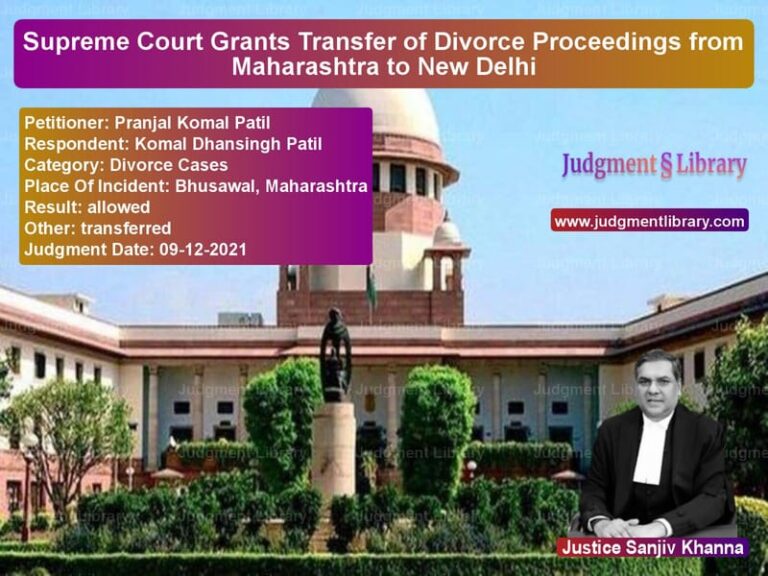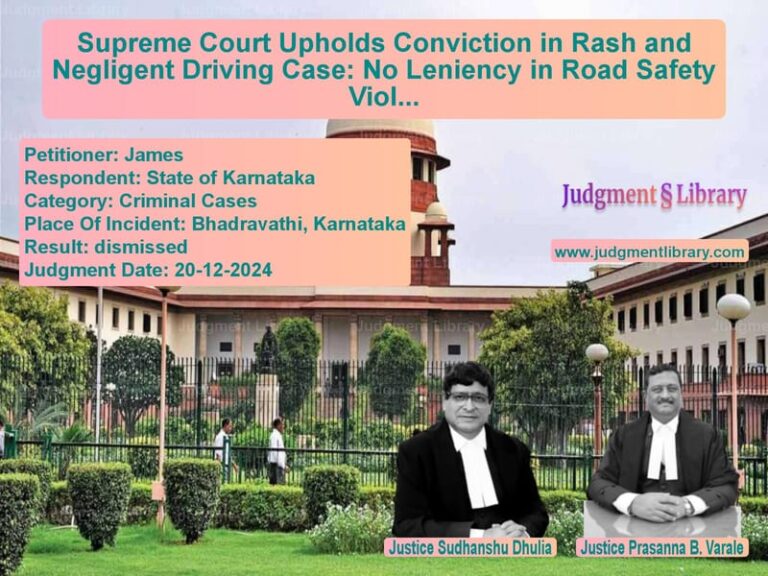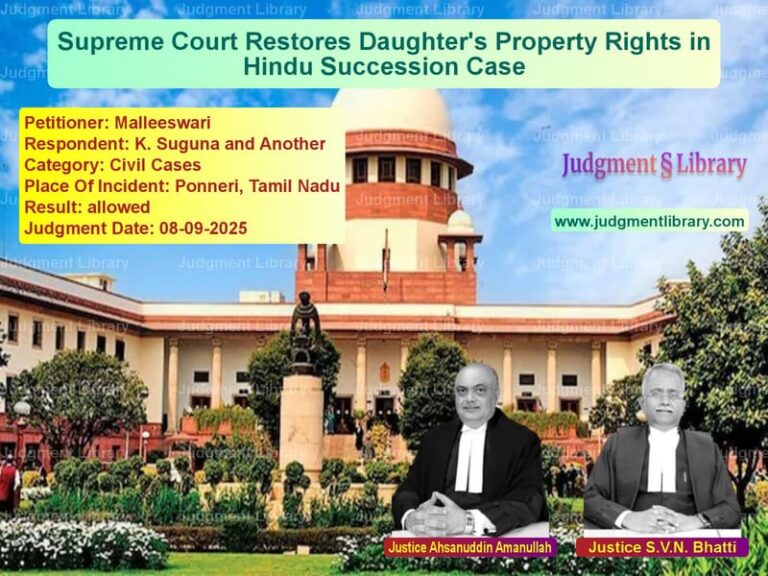Power of Magistrates to Summon Unnamed Accused: Supreme Court Ruling in Nahar Singh vs. State of Uttar Pradesh
The case of Nahar Singh vs. State of Uttar Pradesh deals with the important legal question of whether a Magistrate, while taking cognizance of an offense based on a police report under Section 190(1)(b) of the Code of Criminal Procedure (Cr.P.C.), can summon an individual who was neither named in the First Information Report (FIR) nor listed as an accused in the police chargesheet. The Supreme Court’s ruling in this case provides clarity on the powers of Magistrates in such situations.
Background of the Case
The case originated from an FIR filed on May 9, 2012, in Police Station Chhatari, Bulandshahr, Uttar Pradesh, by the mother of a young woman (prosecutrix). The FIR alleged that on May 4, 2012, her minor daughter was abducted by one Yogesh and his associates. However, subsequent medical examination found her to be around 18 years old. The charges under which the police report was filed included:
- Section 363 IPC (Kidnapping)
- Section 366 IPC (Abduction for marriage)
- Section 376 IPC (Rape)
After investigating, the police filed a chargesheet against two accused, Yogesh and Rupa, and excluded Nahar Singh, the appellant, from the list of accused.
The prosecutrix’s mother then approached the Chief Judicial Magistrate (CJM), seeking the summoning of Nahar Singh based on the prosecutrix’s statement recorded under Section 164 Cr.P.C., where she had implicated him. However, the CJM initially rejected the request. The matter was taken to the Additional Sessions Judge in a revision petition, who set aside the CJM’s order and directed him to reconsider the request for summoning Nahar Singh. Subsequently, the CJM issued summons to Nahar Singh.
Petitioner’s Arguments (Nahar Singh)
Nahar Singh challenged the order summoning him, arguing:
- Since he was not named in the FIR or in the chargesheet, the Magistrate could not summon him under Section 190(1)(b) Cr.P.C.
- The only way to add him as an accused was through Section 319 Cr.P.C. during trial, if sufficient evidence emerged.
- The High Court erred in affirming the revisional order that allowed summoning him without sufficient basis.
- His name was removed during the second phase of the investigation, indicating lack of evidence against him.
Respondent’s Arguments (State of Uttar Pradesh)
The State argued:
- The Magistrate has the power to summon additional accused based on the material before him, including the victim’s statement under Section 164 Cr.P.C.
- Summoning an accused at the cognizance stage does not require following the procedure under Section 319 Cr.P.C.
- The prosecutrix had clearly named Nahar Singh in her statement, making his summoning justified.
- Magistrates are empowered to ensure that all persons involved in a crime are brought to justice.
Supreme Court’s Observations
The Supreme Court extensively examined the legal framework and past rulings concerning the power of Magistrates to summon additional accused. The Court noted:
- Under Section 190(1)(b) Cr.P.C., a Magistrate takes cognizance of an offense and not just the individuals named in the chargesheet.
- A Magistrate is not bound by the police report and can summon any person whose involvement in the crime appears evident from the material before the court.
- The case was different from proceedings under Section 319 Cr.P.C., which applies when a trial is already underway. Here, the Magistrate was acting before the trial stage.
- The principle laid down in Kishun Singh vs. State of Bihar (1993) and Dharam Pal vs. State of Haryana (2014) supports the Magistrate’s power to summon additional accused at the cognizance stage.
The Court ruled:
“The summoning of an additional accused is an integral part of the proceedings where allegations of facts constituting an offense exist. At the time of taking cognizance, the Magistrate has only to see whether prima facie there are cogent reasons for issuing the process.”
Final Judgment
The Supreme Court upheld the summoning of Nahar Singh, concluding that:
- The Magistrate had correctly exercised jurisdiction under Section 190(1)(b) Cr.P.C.
- There was no requirement to wait until the trial stage to invoke Section 319 Cr.P.C.
- The prosecution’s material, including the statement under Section 164 Cr.P.C., provided sufficient ground for summoning.
- The High Court had correctly upheld the order of the Sessions Judge directing the summoning of Nahar Singh.
Key Takeaways from the Judgment
- Magistrate’s Power to Summon: A Magistrate taking cognizance under Section 190(1)(b) Cr.P.C. can summon a person not named in the police report if there is prima facie evidence.
- Independence from Police Chargesheet: The police report does not bind the Magistrate; they can rely on other evidence, such as statements recorded under Section 164 Cr.P.C.
- Difference Between Sections 190 and 319 Cr.P.C.: Summoning an accused at the pre-trial stage falls under Section 190, while adding an accused during trial is governed by Section 319.
- Judicial Oversight in Investigation: Courts have the authority to rectify lapses in police investigations by summoning omitted individuals when evidence justifies their involvement.
Conclusion
The Supreme Court’s ruling in this case reinforces the power of Magistrates to ensure that no guilty person escapes prosecution due to investigative lapses. The decision provides clarity on when and how additional accused can be summoned at the pre-trial stage, ensuring that all individuals involved in an offense are brought to justice.
Petitioner Name: Nahar Singh.Respondent Name: State of Uttar Pradesh & Another.Judgment By: Justice Vineet Saran, Justice Aniruddha Bose.Place Of Incident: Bulandshahr, Uttar Pradesh.Judgment Date: 16-03-2022.
Don’t miss out on the full details! Download the complete judgment in PDF format below and gain valuable insights instantly!
Download Judgment: nahar-singh-vs-state-of-uttar-prade-supreme-court-of-india-judgment-dated-16-03-2022.pdf
Directly Download Judgment: Directly download this Judgment
See all petitions in Bail and Anticipatory Bail
See all petitions in Fraud and Forgery
See all petitions in Attempt to Murder Cases
See all petitions in Cyber Crimes
See all petitions in Extortion and Blackmail
See all petitions in Judgment by Vineet Saran
See all petitions in Judgment by Aniruddha Bose
See all petitions in dismissed
See all petitions in supreme court of India judgments March 2022
See all petitions in 2022 judgments
See all posts in Criminal Cases Category
See all allowed petitions in Criminal Cases Category
See all Dismissed petitions in Criminal Cases Category
See all partially allowed petitions in Criminal Cases Category







